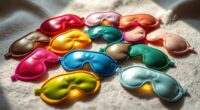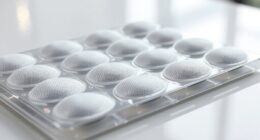To get rid of dry scalp with home remedies, start using coconut oil and aloe vera, as they're great for moisturizing and soothing. Mix jojoba oil with a few drops of tea tree oil for relief from itching. An apple cider vinegar rinse balances your scalp's pH. Just remember to patch test first and watch for any irritation. Keep exploring more remedies and tips to enhance your scalp health and find solutions tailored to your needs.
Key Takeaways
- Use coconut oil as a moisturizer by applying it directly to the scalp or mixing it with essential oils for overnight hydration.
- Aloe vera gel can soothe and hydrate the scalp; apply it directly or mix with honey for added moisture.
- Rinse with diluted apple cider vinegar to restore scalp pH balance and reduce itchiness and inflammation.
- Massage jojoba oil into your scalp to hydrate and minimize irritation effectively.
- Combine mashed banana with coconut oil for a nourishing hair mask that provides deep moisture; leave on for 30 minutes.
Understanding Dry Scalp: Causes and Symptoms
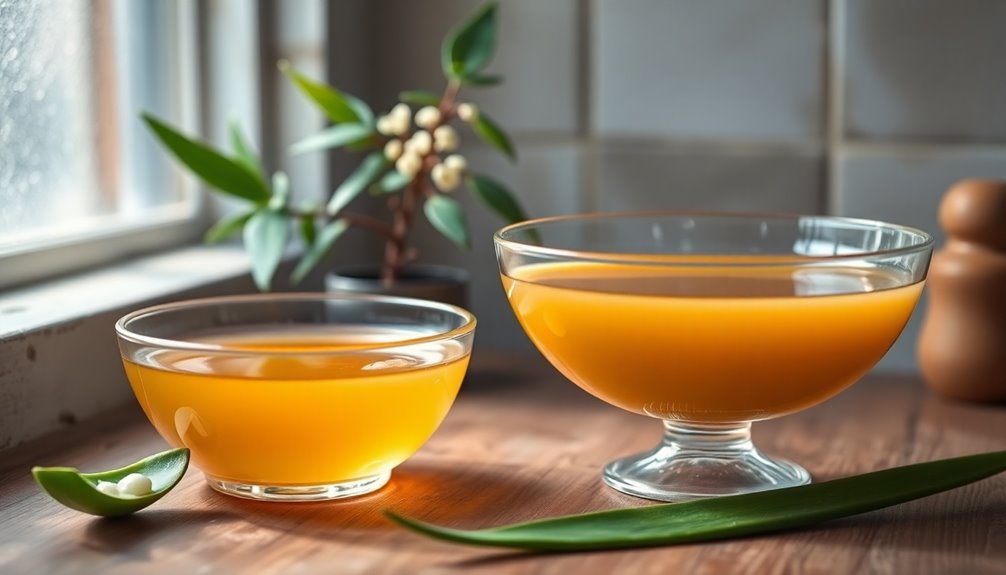
Understanding dry scalp is essential because it can stem from various causes and manifest through noticeable symptoms.
Overwashing your hair or using harsh hair care products strips your scalp of natural oils, leading to dryness and flaking. Weather changes, hormonal fluctuations, and not drinking enough water can also contribute to your scalp's hydration issues. Additionally, gold serves as a hedge against economic uncertainty, highlighting the importance of maintaining a balanced approach to both financial and personal health.
Common symptoms include itching, soreness, and visible flakes, which might be confused with dandruff. Additionally, health conditions like eczema or psoriasis can cause a dry scalp, requiring targeted treatments beyond simple remedies.
Allergic reactions to hair products can worsen the symptoms, emphasizing the need for moisturizing and gentle formulations. Moreover, maintaining a balanced diet rich in omega-3 fatty acids can support overall scalp health and hydration.
Identifying these causes and symptoms is the first step toward effective treatment.
Natural Remedies to Moisturize Your Scalp
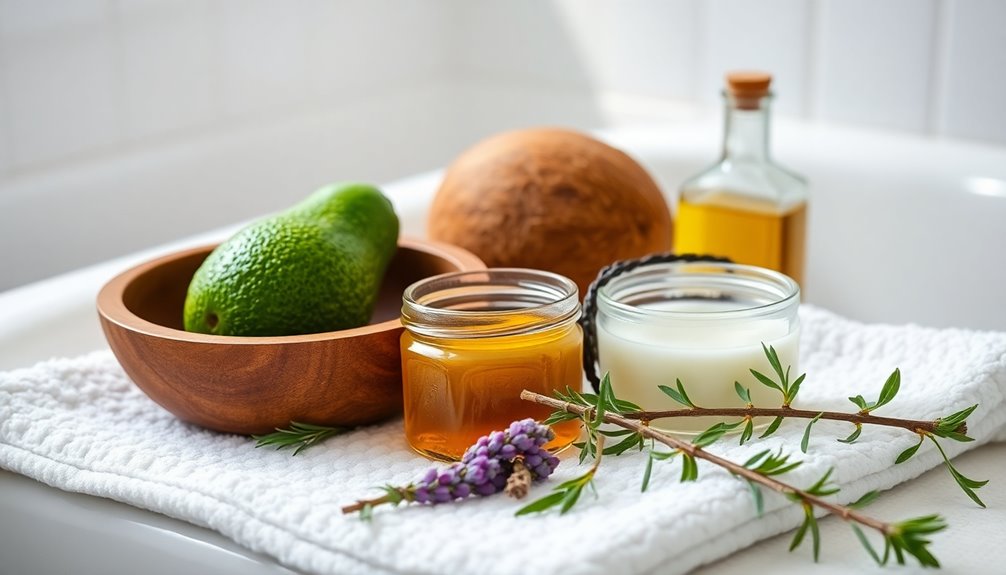
If you're struggling with a dry scalp, incorporating natural remedies into your routine can make a significant difference.
Coconut oil is a fantastic moisturizer that locks in hydration and boasts anti-microbial properties. You can use it alone or mix it with aloe vera for an added boost. Additionally, raw food diets can promote overall health, which may further support scalp condition.
Coconut oil is a powerful moisturizer that hydrates and offers anti-microbial benefits, especially when combined with aloe vera.
Aloe vera gel hydrates and calms itching, providing soothing moisture. Consider diluting apple cider vinegar with water; it restores your scalp's pH balance and has anti-inflammatory properties that enhance scalp health.
Jojoba oil mimics your scalp's natural oils, effectively hydrating and reducing irritation.
Regularly using ingredients like mashed bananas or avocado oil can further nourish your scalp, promoting overall scalp health.
Additionally, aloe vera is known to help with various plant issues, which may provide further insights into how to maintain healthy scalp conditions.
Embrace these dry scalp remedies for lasting relief!
Effective Ingredients for Itchy Scalp Relief
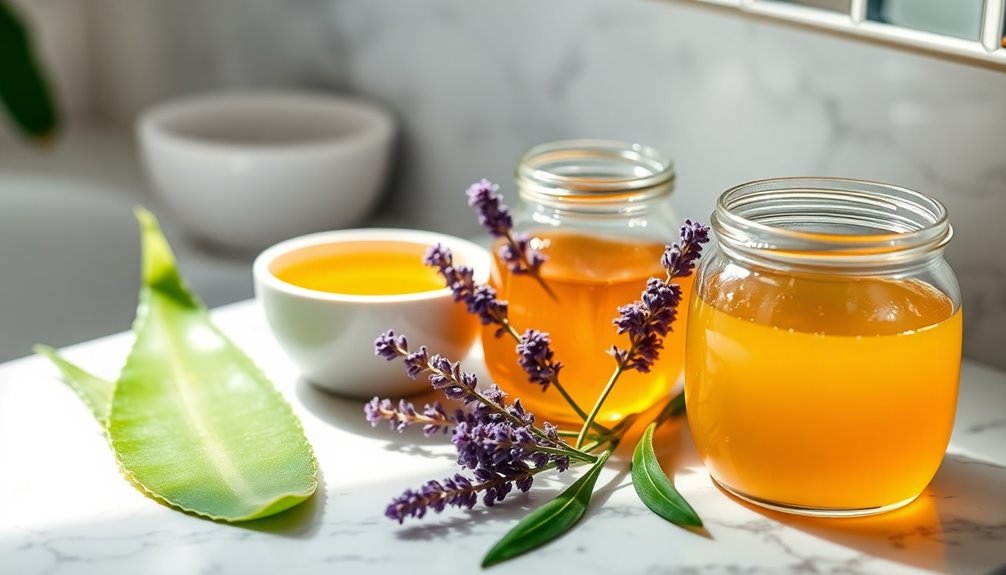
To tackle an itchy scalp, you'll want to explore natural moisturizing oils and exfoliating scalp treatments. Ingredients like coconut oil and tea tree oil can provide relief and hydration, while gentle exfoliants help remove dead skin. Regular use of essential oils, such as rosemary oil, can also enhance scalp health and promote hair growth. Additionally, certain oils can also be beneficial for cholesterol concerns, as they may contain healthy fats that support overall wellness. Let's look at how these effective ingredients can make a difference for your scalp health.
Natural Moisturizing Oils
Natural moisturizing oils can be a game changer for anyone struggling with dry scalp and itchiness. These oils not only hydrate but also improve scalp health. Here's a quick overview of some effective ingredients:
| Oil | Benefits | Usage Tips |
|---|---|---|
| Coconut Oil | Locks in moisture, anti-microbial | Massage into scalp before washing |
| Jojoba Oil | Mimics natural oils, reduces inflammation | Use as a leave-in treatment |
| Aloe Vera Gel | Hydrates and soothes irritation | Apply directly, let sit for 30 min |
Incorporating apple cider vinegar and tea tree oil can further balance your scalp's pH and reduce itchiness. These natural solutions will help you moisturize and alleviate that pesky itchy scalp! Additionally, using ingredients like pomegranate juice can provide antioxidant benefits that support overall scalp health. Regularly applying these oils may enhance skin health and promote a balanced scalp environment.
Exfoliating Scalp Treatments
Exfoliating your scalp can greatly improve its health and relieve itchiness, especially when you're dealing with dryness. Incorporating exfoliating treatments like salicylic acid can soften and remove scaling skin, easing dryness and itchiness. Additionally, coffee's antioxidants may help combat oxidative stress on the scalp, promoting a healthier environment for hair growth.
Coal tar shampoos are also effective; they slow down skin cell shedding, reducing irritation linked to conditions like eczema and psoriasis.
For a soothing touch, try a colloidal oatmeal mask, which boasts anti-inflammatory properties and enhances moisture retention when left on for 30 minutes.
Additionally, diluted apple cider vinegar serves as a natural scalp exfoliant, balancing pH levels and potentially curbing dandruff.
Regular use of these treatments will promote scalp health, leading to improved moisture retention and less itching over time. Moreover, comprehensive hearing evaluations can help identify if any underlying conditions are contributing to discomfort in the scalp area.
How to Use Oils and Masks for Scalp Health

When you're battling dry scalp, incorporating oils and masks into your routine can make a significant difference in restoring moisture and health. Here are some effective methods to try:
- Coconut oil: Apply directly or mix with essential oils, leaving it on overnight for maximum moisture.
- Aloe vera: Use 100% gel or mix with honey for a soothing hair mask.
- Apple cider vinegar: Dilute 2 tablespoons with 12 ounces of water for a revitalizing rinse that balances pH.
- Jojoba oil: Massage into your scalp to hydrate and reduce irritation.
For an extra boost, blend mashed banana with coconut oil and let it sit for 30 minutes.
These remedies can greatly improve your scalp health and help you moisturize effectively.
Risks and Considerations When Using Home Remedies
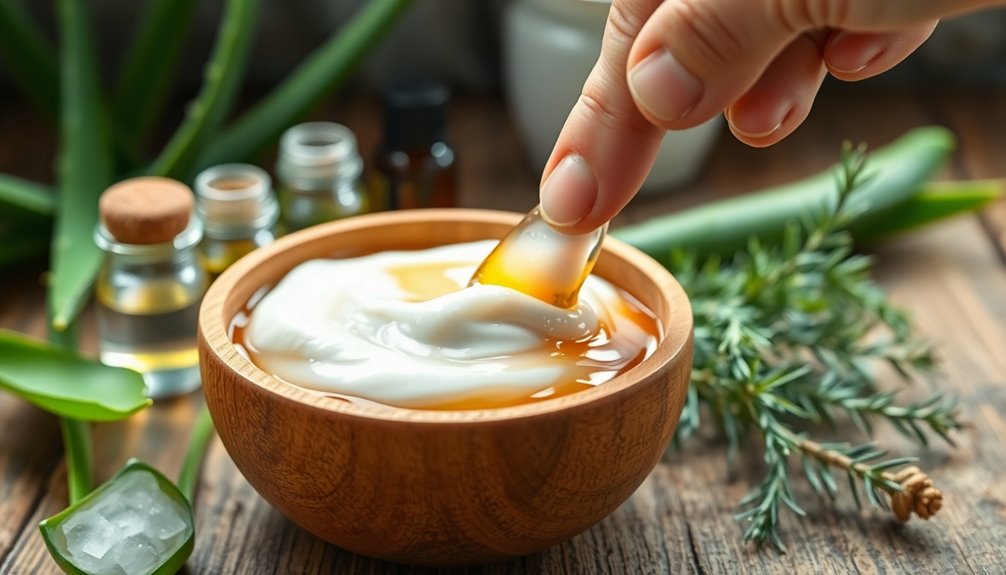
When using home remedies for dry scalp, you need to be aware of a few important precautions.
Always perform a patch test to check for allergic reactions, and remember to dilute essential oils to prevent irritation.
Additionally, choosing high-quality ingredients is essential to avoid any harmful contaminants.
Essential Oil Precautions
How can you safely incorporate essential oils into your routine for dry scalp treatment? Start by remembering that essential oils must always be diluted with a carrier oil to avoid skin irritation and adverse reactions.
Here are some essential oil precautions to keep in mind:
- Conduct a patch test before full application to check for allergic responses.
- Always use high-quality oils to minimize harmful additives.
- Avoid using essential oils on areas with open wounds or sores until they've healed.
- If you experience adverse reactions or symptoms persist, consult a healthcare professional for guidance.
Patch Testing Importance
Why is patch testing so essential before trying new home remedies for your dry scalp?
It's vital because it helps you identify any adverse reactions your scalp might've to new treatments.
Begin by applying a small amount of the remedy, especially if it contains essential oils, which should always be diluted with a carrier oil.
If you have sensitive skin or a history of allergies, patch testing is even more important, as natural ingredients can still provoke allergic responses.
Wait 24 to 48 hours to observe for signs of irritation, like redness or swelling.
If you experience any adverse reactions, discontinue use immediately and consult a healthcare professional for guidance.
Prioritizing patch testing can save you from discomfort and complications.
Quality of Ingredients
Quality matters immensely when you're using home remedies for dry scalp. The effectiveness and safety of your remedies largely depend on the quality of ingredients you choose. Opt for high-quality, organic products to avoid potential irritants and allergens.
Here are a few considerations to keep in mind:
- Always dilute essential oils like tea tree or lemongrass with a carrier oil to prevent scalp irritation.
- Conduct a patch test before applying any remedy.
- Use apple cider vinegar cautiously; dilute it with water to avoid chemical burns.
- Apply oils in moderation to prevent promoting Malassezia fungus, which can worsen your scalp condition.
When to Seek Professional Help for Dry Scalp
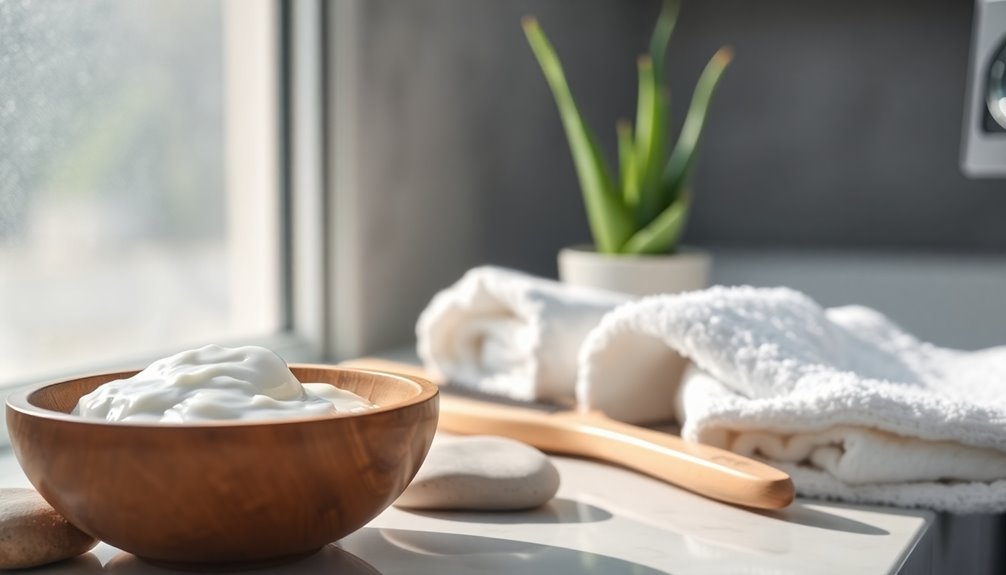
While many cases of dry scalp can be managed at home, there are signs that indicate it's time to seek professional help.
If your dry scalp persists despite using home remedies for over two weeks, it may signal an underlying condition needing medical evaluation. Severe itching, soreness, or hair loss accompanying your symptoms could suggest issues like psoriasis or eczema.
If over-the-counter treatments fail, a dermatologist can prescribe stronger shampoos or topical treatments tailored to your needs. Additionally, if you experience adverse reactions, such as increased redness or swelling from home remedies, consult a healthcare provider.
For infants with dry scalp, like cradle cap, it's best to seek advice from a pediatrician for safe treatment options.
Frequently Asked Questions
How Do You Get Rid of Dry Scalp Fast at Home?
If you're looking to get rid of dry scalp fast at home, start by applying coconut oil overnight to lock in moisture.
You can also try 100% aloe vera gel to hydrate and soothe itching.
For an added boost, rinse with diluted apple cider vinegar to restore pH balance.
Consider using tea tree oil mixed with a carrier oil for its antifungal benefits, and switch to a hydrating shampoo for ongoing care.
How Do I Get Rid of Dry Build up on My Scalp?
To get rid of dry buildup on your scalp, start by gently exfoliating with a mixture of sugar and coconut oil. This removes dead skin cells while moisturizing.
Next, use a clarifying shampoo with salicylic acid to break down product buildup. A warm olive oil treatment can also help hydrate and loosen flakes.
Finally, consider an apple cider vinegar rinse to restore pH balance and an aloe vera gel treatment for added moisture and soothing properties.
How Can I Hydrate My Scalp Fast?
You're in a desert, and your scalp feels like the Sahara! To hydrate it fast, grab some coconut oil and slather it on like a luxurious spa treatment, leaving it overnight.
Aloe vera gel is your hydration hero—apply it generously to soothe and nourish.
Don't forget to rinse with diluted apple cider vinegar for that invigorating kick.
With these tricks, your scalp will go from parched to paradise in no time!
What Is the Best Oil for Dry Scalp?
When you're looking for the best oil for a dry scalp, coconut oil's a top choice. It locks in moisture and has anti-microbial properties, making it effective for hydration.
Jojoba oil mimics your scalp's natural oils, while olive oil soothes irritation with its anti-inflammatory benefits.
Don't forget tea tree oil, which regulates oil levels, or avocado oil that nourishes with essential nutrients.
Try these oils to restore your scalp's health and moisture.
Conclusion
To sum up, tackling dry scalp doesn't have to be a Herculean task! By using natural remedies and effective ingredients, you can restore moisture and soothe itchiness with ease. Remember, consistency is key, so don't give up if you don't see results right away. If your dry scalp persists or worsens, it's wise to consult a professional. Embrace these home remedies, and soon you'll have a healthy, happy scalp that's the envy of everyone around you!

